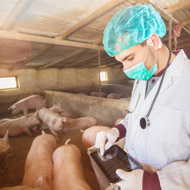
FSA survey monitors changes in consumer attitudes
Animal welfare has been named one of the top food issues of concern in the Food Standards Agency’s Biannual Public Attitudes Tracker.
The survey, conducted with consumers across England, Wales and Northern Ireland, monitors changes in consumer attitudes towards the FSA and food-related issues.
Amongst the top food issues of concern is the amount of sugar in food, food waste, food prices and animal welfare. Respondents also raised concerns about food hygiene when eating out, food poisoning, food additives and chemicals from the environment.
Forty-five per cent of respondents reported a concern about food safety in UK restaurants, pubs, cafes and takeaways, whilst 42 per cent of respondents reported a concern about food safety in UK shops and supermarkets.
The survey also revealed that the majority of people trust that food is what it says it is and that it is accurately labelled (74 per cent).
Salmonella and E-coli were by far the most commonly known types of food poisoning (total awareness of 89 per cent and 82 per cent respectively). The perceived most likely sources of food poisoning were raw chicken or turkey (79 per cent), followed by shellfish (54 per cent), reheated take-away food (47 per cent) and eggs (38 per cent).
The survey took place in November 2017 with a representative sample of 1,989 adults.



 The Federation of Independent Veterinary Practices (FIVP) has announced a third season of its podcast, Practice Matters.
The Federation of Independent Veterinary Practices (FIVP) has announced a third season of its podcast, Practice Matters.